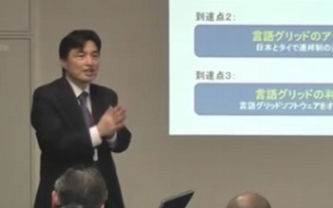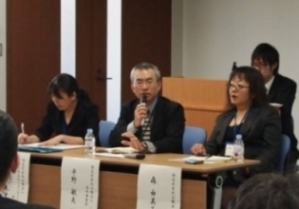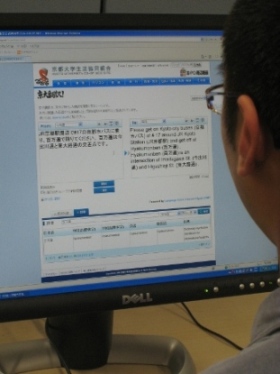Contents
[Federated Operation of the Language Grid Started]
![]()
[Language Grid Symposium 2011]
![]()
[Multilingual Gaming Simulation Using Language Grid Wins FOST Prize]
![]()
[Future Services of the Language Grid]
![]()
[Monthly Maintenance for March and April]
![]()
[KYODAI HONYAKU! Is Now Open to the Public]
![]()
[Language Grid Users] Kyoto University Co-op
![]()
Federated Operation of the Language Grid Started
With the start of federated operation of the Language Grid by Language Grid Kyoto Operation Center (Department of Social Informatics, Kyoto University) and Language Grid Bangkok Operation Center (NECTEC), NICT and Kyoto University issued a press release on February 14. On the same day, NICT, Kyoto University, and NECTEC conducted a joint Japan-Thailand press conference, using a teleconference hookup, at which they also gave a demonstration. This press release was reported not only by Japanese media, including the Yomiuri Shimbun, Sankei Shimbun, Nikkan Kogyo Shimbun, Nikkei Sangyo Shimbun, and Kyoto Shimbun, but also by Thai media outlets such as the Bangkok Post.
At the joint press conference, NICT gave a demonstration in which Thai participants were guided around Kyoto by Thai voice. This demonstration was made possible by combining a Japanese-English translation service with a Kyoto Tourism Dictionary service registered on the Kyoto Language Grid (51 languages and 106 services), and an English-Thai translation service and Thai text-to-speech service registered on the Thai Language Grid (13 languages and 20 services).

Language Grid Symposium 2011

Language Grid Symposium 2011 was held in Tokyo (Feb. 21) and Kyoto (Feb. 22). The accomplishments of the Language Grid project over the past five years are reported.
First, the current status and future prospects of the Language Grid were presented. Achievements included the service-oriented language infrastructure, which involves 140 organizations in 18 countries across Asia, starting with federated operation by Japan and Thailand, and the accelerating use of the Language Grid via contributions from the open source community. For the future, evolving worldwide, assuring the QoS of language ser-vices, and creating heterogeneous Service Grids in various domains were described. Some of the presentation slides are available on the Web.

At the end of the Symposium, user organizations demonstrated their software and activities using the Language Grid. NICT and NECTEC introduced the federated operation by Kyoto operation center and Bangkok operation center, as well as the latest version of Tool-box based on the federated operation. Kyoto University showed a website specializing in translation at Kyoto University named "KYODAI HONYAKU!" (Kyoto Univ. Translation), along with a Wikipedia article multilingualization project, and
a G30 community site that aims to support foreign students using Toolbox. User organizations that have been applying the Language Grid to their field described their activities. The Center for Multicultural Society Kyoto and Wakayama University showed M3, which supports multilingual dialogs in the medical field. Kansai University introduced the Multilingual Educational Support Project, which provides multilingual terms used in school, and Kwansei Gakuin University presented CoSMOS, which allows kids to create disaster pre-vention maps through learning with children in other countries. NPO Pangaea described how they support agriculture in Vietnam by having children communicate with agricultural experts in Japan.
Multilingual Gaming Simulation Using Language Grid Wins FOST Prize3
Prof. Reiko Hishiyama, Faculty of Science and Engineering, Waseda University, has been awarded the "FOST Prize" from the Foundation for the Fusion Of Science and Technology (FOST) for her research "Integration of Science Cafe and Participatory Gaming Simulation Expanding Possibilities of Science and Technology Communication." (Article in Impress Watch, in Japanese). FOST provides a research grant for research related to the integration of science and technology. The FOST prize is given to the most outstanding research conducted with the help of a research grant from FOST. Prof. Hishiyama's winning research realized a global gaming simulation in which people can communicate in their own languages using the Language Grid. The novelty of the research, which encompassed multilingual communication in science and the integration of a science cafe and participa-tory gaming simulation, were factors in the judges’ decision.
Future Services of the Language Grid
This March, NICT will complete the five-year medium-term plan, including the NICT Lan-guage Grid project. In its next five-year plan (from 2011 to 2016), NICT will continue to research and develop a general-purpose service platform by improving the current Language Grid. Through these efforts, NICT is continuing to maintain and reinforce the Language Grid software and language service wrappers. It will also continue to provide the Language Grid Toolbox Cloud Service.
However, the J-Server and WEB-Transer provided by NICT (Servicd ID: NICTJServer, NICTCLWT) will be unregistered in the end of March due to a change in the project struc-ture. If you use these services, please switch to an alternative.
Monthly Maintenance for March and April
The monthly maintenance of the Language Grid for March was conducted on the Mon-day, March 7. The monthly maintenance for April will be conducted on Monday, April 4 at 18:00-21:00 JST. If you wish to use the Language Grid during this period, please contact us in advance at operation [at] langrid.org.
KYODAI HONYAKU! Is Now Open to the Public
Ishida & Matsubara Laboratory at Kyoto University has opened “KYODAI HONYAKU!” with Kyoto University Co-op from February 10, 2011. “KYODAI HONYAKU!” is the translation service specialized in Kyoto University.
More than 15,000 Japanese and English dictionary entries containing expression related to Kyoto University are registered, including Kyoto University building names, subject names of Liberal Arts and General Education Courses, general affairs expressions, etc. Also, there are more than 5,000 Chinese (Simplified, Traditional) and Korean entries, which will be continuously added. Therefore, the composition of the dictionary and translation services enables highly accurate translation on subjects related to Kyoto University. Moreover, user can search words registered this system.
One of problems in translation is that community-oriented words and expressions are hard to translate. As an example, “百万遍 (Hyakumanben)” is translated to “One million times” by other translators as opposed to “Hyakumanben” by “KYODAI HONYAKU!”. (“百万遍” is popular intersection around Kyoto University. ) During translations, added dictionary entries are included by machine translators to give better translation result.
In addition, more than 2,000 sentences containing expression related to Kyoto University are registered, which are used to train KyotoEBMT developed by Kurohashi Laboratory, Kyoto University for increasing the quality of the translations. KyotoEBMT is the example-based machine translation learns from parallel texts and outputs high-quality translation results if an input sentence is similar to the given parallel texts.

Language Grid Users: Kyoto University Co-op

Kyoto University Co-op has opened “KYODAI HONYAKU!” on the website from February 10, 2011. It is based on the Language Grid, and is supported by Rieko Inaba, Lecturer, Department of Social Informatics, Kyoto University and many others.
Put simply, “KYODAI HONYAKU!” is a translation site for people involved in campus life at Kyoto University. It enables highly accurate translation with about 15,000 English dictionary words registered (and 5,000 words in Chinese and Korea) on subjects related to Kyoto University, such as the college itself, lecture rooms names, lecture names, faculty names, local geography, and the location of the co-op.
Kyoto University has been striving to assist foreign students in their general campus life, following the creation of bachelor degree courses in English at the engineering department and other changes starting 2011.
Kyoto University Co-op has been offering halal food and encouraging social interaction situations for foreign students centered on the “foreign student committee,” in which stu-dents themselves take the lead. We hope this “KYODAI HONYAKU!” proves to be a useful life support tool for foreign students.
We aim to enhance the support content from the welfare side to make campus life for for-eign students more fulfilling and significant.
